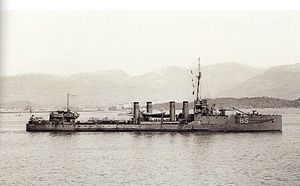Bisson-class destroyer
 A profile view of Bisson in harbor | |
| Class overview | |
|---|---|
| Name | Bisson class |
| Operators | |
| Preceded by | Bouclier class |
| Succeeded by | Enseigne Roux class |
| Built | 1911–1914 |
| In commission | 1912–1934 |
| Completed | 6 |
| Lost | 1 |
| Scrapped | 5 |
| General characteristics (as built) | |
| Type | Destroyer |
| Displacement | 756–791 t (744–779 long tons) |
| Length | 78.1 m (256 ft 3 in) (p/p) |
| Beam | 8.6 m (28 ft 3 in) |
| Draft | 3.1 m (10 ft 2 in) |
| Installed power |
|
| Propulsion | 2 shafts; 2 steam turbines |
| Speed | 30 knots (56 km/h; 35 mph) |
| Range | 1,950 nmi (3,610 km; 2,240 mi) at 14 knots (26 km/h; 16 mph) |
| Complement | 80–83 |
| Armament |
|
The Bisson class consisted of six destroyers built for the French Navy during the 1910s. One ship was lost during the First World War, but the others survived to be scrapped afterwards.
Design and description
The Bisson class were enlarged versions of the preceding Bouclier class built to a more standardized design. The ships had a length between perpendiculars of 78.1 meters (256 ft 3 in), a beam of 8.6 meters (28 ft 3 in), and a draft of 3.1 meters (10 ft 2 in).[1] Designed to displace 850–880 metric tons (837–866 long tons),[2] they displaced 756–791 t (744–779 long tons) at normal load. Their crew numbered 80–83 men.[1]
The ships were powered by a pair of steam turbines, each driving one propeller shaft using steam provided by four Indret water-tube boilers. The engines were designed to produce 15,000 shaft horsepower (11,000 kW) which was intended to give the ships a speed of 30 knots (56 km/h; 35 mph). The ships carried 164 tonnes (161 long tons) of fuel oil which gave them a range of 1,450 nautical miles (2,690 km; 1,670 mi) at cruising speeds of 14 knots (26 km/h; 16 mph).[1]
The primary armament of the Bisson-class ships consisted of two 100-millimeter (3.9 in) Modèle 1893 guns in single mounts, one each fore and aft of the superstructure, and four 65-millimeter (2.6 in) Modèle 1902 guns distributed amidships. They were also fitted with two twin mounts for 450-millimeter (17.7 in) torpedo tubes amidships.[2]
Ships

The class is named in tribute to the French Admiral Hippolyte Bisson who sacrificed himself aboard the ship Panayoti in 1827 during the Greek War of Independence.
| Name | Builder | Launched | Fate |
|---|---|---|---|
| Bisson | Arsenal de Toulon | 12 September 1912 | Struck, June 1933 |
| Renaudin | 20 March 1913 | Torpedoed and sunk by U-6 off Durazzo, 18 March 1916 | |
| Commandant Lucas | 11 July 1914 | Struck, June 1933 | |
| Protet | Arsenal de Rochefort | 15 October 1913 | Struck, 1933 |
| Mangini | Schneider et Cie, Chalon-sur-Saône | 31 March 1913 | Struck, 1934 |
| Magon | Ateliers et Chantiers de Bretagne, Nantes | 19 April 1913 | Struck, 16 February 1926 |
Service history
The class served primarily in the Mediterranean Sea during the First World War, with Bisson sinking the Austrian submarine U-3 on 13 August 1915 and Renaudin being sunk by U-6 in return.[1]
References
Bibliography
- Couhat, Jean Labayle (1974). French Warships of World War I. London: Ian Allan. ISBN 0-7110-0445-5.
- Gardiner, Robert & Gray, Randal (1985). Conway's All The World's Fighting Ships 1906–1921. London: Conway Maritime Press. ISBN 0-85177-245-5.
- Osborne, Eric W. (2005). Destroyers – An Illustrated History of Their Impact. Santa Barbara, California: ABC-Clio. ISBN 1-85109-479-2.
- Prévoteaux, Gérard (2017). La marine française dans la Grande guerre: les combattants oubliés: Tome I 1914–1915 [The French Navy during the Great War: The Forgotten Combatants, Book I 1914–1915]. Collection Navires & Histoire des Marines du Mond. Vol. 23. Le Vigen, France: Éditions Lela presse. ISBN 978-2-37468-000-2.
- Prévoteaux, Gérard (2017). La marine française dans la Grande guerre: les combattants oubliés: Tome II 1916–1918 [The French Navy during the Great War: The Forgotten Combatants, Book II 1916–1918]. Collection Navires & Histoire des Marines du Mond. Vol. 27. Le Vigen, France: Éditions Lela presse. ISBN 978-2-37468-001-9.
- Roberts, Stephen S. (2021). French Warships in the Age of Steam 1859–1914: Design, Construction, Careers and Fates. Barnsley, UK: Seaforth Publishing. ISBN 978-1-5267-4533-0.
